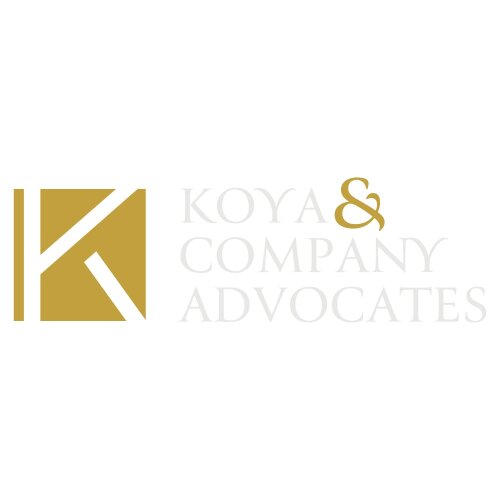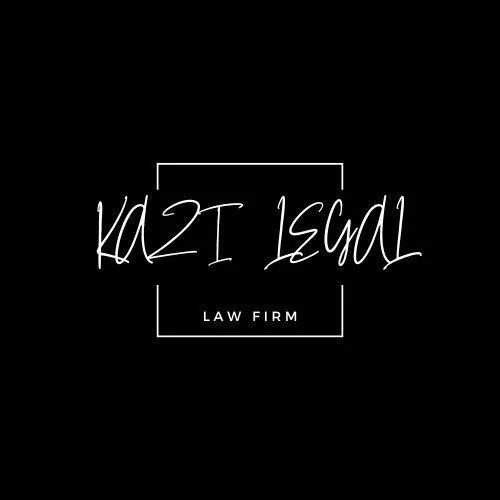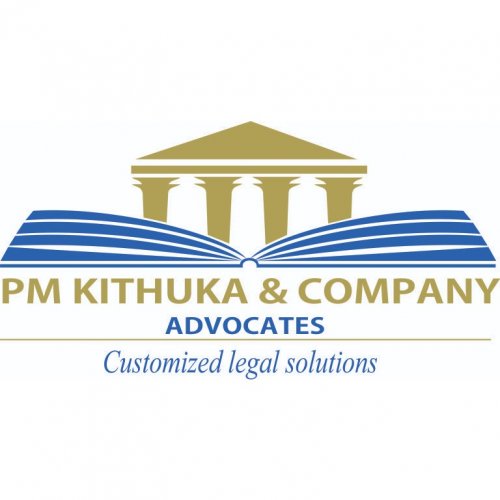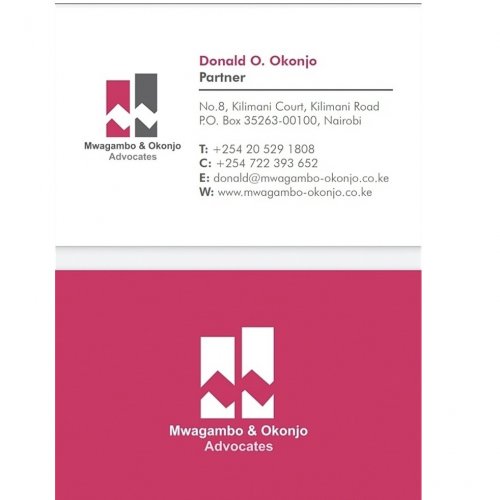Best Due Diligence Lawyers in Nairobi
Share your needs with us, get contacted by law firms.
Free. Takes 2 min.
List of the best lawyers in Nairobi, Kenya
Legal guides written by Adroit Law LLP:
- Kenya Launches Digital Nomad Visa: A Gateway for Remote Workers
- Navigating the Payment System License Maze in Kenya
- Navigating the Complexities of Mining Licenses and Permits in Kenya: A Look into Artisanal and Large-Scale Operations
About Due Diligence Law in Nairobi, Kenya
Due Diligence refers to a comprehensive investigation and analysis conducted by individuals or organizations to evaluate the legal, financial, and operational aspects of a business or transaction. In Nairobi, Kenya, Due Diligence plays a crucial role in various legal matters, including mergers and acquisitions, real estate transactions, and business partnerships.
Why You May Need a Lawyer
While it is possible to conduct due diligence without legal assistance, engaging a lawyer can provide invaluable expertise and guidance throughout the process. Lawyers specializing in Due Diligence in Nairobi, Kenya can help you navigate complex legal frameworks, ensure compliance with relevant laws and regulations, and protect your rights and interests.
Local Laws Overview
In Nairobi, Kenya, several laws and regulations govern Due Diligence practices. It is important to understand these key aspects:
- The Companies Act: Regulates the legal requirements and procedures for conducting Due Diligence in relation to companies.
- The Land Act: Governs Due Diligence involving real estate transactions, including property searches, land use permissions, and title deed verifications.
- The Anti-Corruption and Economic Crimes Act: Prohibits bribery, corruption, and fraudulent practices during Due Diligence investigations.
- The Banking Act: Pertains to Due Diligence requirements when dealing with financial institutions, including reviewing loan agreements and assessing financial risks.
Frequently Asked Questions
1. What is the purpose of conducting Due Diligence?
Due Diligence helps individuals and organizations assess the risks and benefits associated with a business or transaction. It allows for a thorough evaluation of legal, financial, and operational matters to make informed decisions and mitigate potential risks.
2. How long does the Due Diligence process usually take?
The timeframe for Due Diligence can vary depending on the complexity and scope of the matter. It can range from a few weeks to several months. However, it is advisable to establish realistic deadlines and milestones at the outset.
3. What documents are typically reviewed during Due Diligence?
Common documents include financial statements, contracts, licenses, permits, tax records, employee agreements, intellectual property registrations, and any relevant legal or court proceedings.
4. Can Due Diligence uncover hidden liabilities?
Yes, Due Diligence is designed to identify any potential risks or liabilities associated with a business or transaction. It aims to uncover any hidden debts, legal disputes, regulatory non-compliance, or other potential issues.
5. Should I involve legal counsel during Due Diligence?
Engaging legal counsel during Due Diligence is highly recommended, especially for complex matters. A lawyer can provide legal expertise, review documents, identify potential legal risks, and ensure compliance with local laws and regulations.
Additional Resources
For further information and resources related to Due Diligence law in Nairobi, Kenya, consider referring to the following:
- Law Society of Kenya: https://lsk.or.ke
- Kenya Law: https://kenyalaw.org
- Nairobi City County Government: https://nairobi.go.ke
Next Steps
If you require legal assistance or advice regarding Due Diligence in Nairobi, Kenya:
- Identify reputable law firms or lawyers specializing in Due Diligence in Nairobi.
- Schedule a consultation to discuss your specific needs and concerns.
- Provide relevant documents and information to the lawyer for further assessment.
- Work closely with the lawyer throughout the Due Diligence process, seeking clarification whenever needed.
- Review the findings and recommendations provided by your lawyer and make an informed decision based on the results of the Due Diligence investigation.
Lawzana helps you find the best lawyers and law firms in Nairobi through a curated and pre-screened list of qualified legal professionals. Our platform offers rankings and detailed profiles of attorneys and law firms, allowing you to compare based on practice areas, including Due Diligence, experience, and client feedback.
Each profile includes a description of the firm's areas of practice, client reviews, team members and partners, year of establishment, spoken languages, office locations, contact information, social media presence, and any published articles or resources. Most firms on our platform speak English and are experienced in both local and international legal matters.
Get a quote from top-rated law firms in Nairobi, Kenya — quickly, securely, and without unnecessary hassle.
Disclaimer:
The information provided on this page is for general informational purposes only and does not constitute legal advice. While we strive to ensure the accuracy and relevance of the content, legal information may change over time, and interpretations of the law can vary. You should always consult with a qualified legal professional for advice specific to your situation.
We disclaim all liability for actions taken or not taken based on the content of this page. If you believe any information is incorrect or outdated, please contact us, and we will review and update it where appropriate.

















